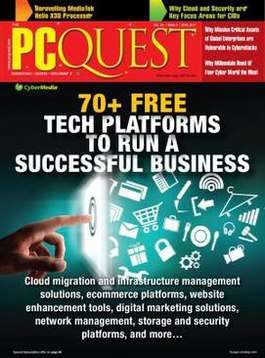PCQuest (magazine)
PCQuest is an Indian technology publication, and part of the Cyber Media group of publications that also publish Dataquest.
 | |
 | |
| Group Editor | Thomas George |
|---|---|
| Categories | Computer |
| Frequency | monthly |
| Publisher | Pradeep Gupta |
| Year founded | 1982 |
| Company | Cyber Media India Limited |
| Country | India |
| Based in | New Delhi |
| Language | English |
| Website | Official website |
History and profile
Founded in 1982, the magazine was originally called PC World, and was one of the earliest technology magazines published in India. In 1992, the magazine was renamed to PC Quest (now PCQuest, without the space).
In 1993, PCQuest began focusing more on actual users, carrying instructional and descriptive articles that enabled users to familiarize themselves with the technologies described.
Today the magazine covers three aspects of IT technologies, products and implementation of solutions, with the focus being on the implementations
PCQ Online BBS
In 1994, PCQuest launched India's first attempt by an Indian publication to create an online, interactive service for its readers, by setting up a BBS. With the proliferation of Internet access as of 1996, this service moved to the web.
PCQ Labs
To support its own sister publications, as well as external entities requiring such services, PCQuest formed PCQ Labs in 1994. The charter of PCQ Labs was to do technology and product reviews, investigate new technologies, and document them for readers. The labs has since been renamed to Cybermedia Labs.
PCQ Cover CD/DVD
In 1995, PCQuest became the first Indian publication to carry a Cover CD - a CD-ROM that carried supplementary information, software and other material. With permission from IBM, the first cover CD carried a fully functional copy of OS/2 Warp 4.
Today the magazine carries a Dual Layer DVD every month.
PCQ Linux Initiative
In March 1996, PCQuest launched its PCQuest Linux Initiative. The initiative included the publication of an annual Linux distribution on the cover CD as well as technical articles about Linux and other Open Source technologies. This has resulted in the distribution of close to a million Linux CD-ROMS in India since 1996. For many people in India, this became the primary source of Linux distributions.
Since 2001, the initiative has been called PCQLinux, which is not entirely correct, as the name only refers to the customized Linux distribution on the CD, not the initiative to promote and support Open Source technologies. The last PCQLinux was published in 2009 after a user poll [1] concluded not much use of CD to urban users, as the broadband access improved and also other ways of getting CD became available.
PCQuest has published "Linux Specials" every year since 1996, except in 1997 and 2001, when it published two such special issues.
Content
PCQuest initially did not retain dedicated writing staff. In late 1992, then-editor Prasanto Kumar Roy initiated a new approach, by sourcing much of PCQuest's content from technology industry writers, contributors and enthusiasts. Over the years, these writers included names such as Atul Chitnis, Kishore Bhargava, Ashish Gulhati, Rishab Aiyer Ghosh, Vipul Ved Prakash, Vinod Unny, Krishna Kumar, Varun Jaitly and others. Subsequently, PCQuest built up the first magazine owned test and review facility for IT products in India.
Today, most of the content is created by a team of in-house technology analysts.
Video
In 2005 PCQuest started experimenting with producing a video on technologies and products that was carried in the cover mounted CD/DVD. In 2006, this became a regular feature of about 25–30 minutes that is carried every month.
References
- "user poll". Forums.pcquest.com. Retrieved 2012-06-07.